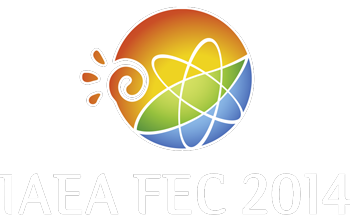Speaker
Mr
Roberto Paccagnella
(Consorzio RFX and Consiglio Nazionale delle Ricerche (CNR))
Description
In this paper numerical simulations of tokamak disruptions in the framework of 3D single fluid visco-resistive magneto-hydro-dynamics (MHD) in full toroidal geometry are presented. The progresses achieved in the last few years by employing the M3D code will be summarized and reviewed. Similarities and differences between simulations and the experimental behavior in existing devices will be also outlined.
New simulations relevant for the ITER device will be presented. In particular the problem of the mode and halo current slow rotations during the current quench phase will be addressed for its implications to the stresses transmitted on the ITER mechanical structure that could be possibly amplified by resonant effects.
Moreover, open critical issues, such as the Lundquist number or wall penetration time scaling of the simulations to ranges of values fully relevant for the ITER device, the necessity or not of a detailed simulation of the thermal quench phase and the correctness/relevance of various normal velocity boundary conditions will be addressed. New directions in disruptions simulations and also, if possible, new strategies for disruptions control/mitigation will be also discussed.
| Country or International Organisation | Italy |
|---|---|
| Paper Number | TH/P4-13 |
Primary author
Mr
Roberto Paccagnella
(Consorzio RFX and Consiglio Nazionale delle Ricerche (CNR))
Co-authors
Dr
Henry Strauss
(HRS Fusion)
Dr
Josh Breslau
(PPPL, Princeton (NJ))
Dr
Linda Sugiyama
(MIT , Cambridge (MA))
Prof.
Stephen C. Jardin
(Princeton Plasma Physics Laboratory)
Mr
Yanovskiy Vadim
(Consorzio RFX)

